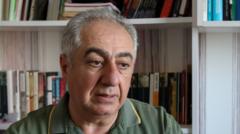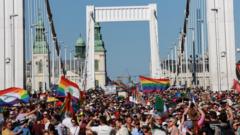Human rights organizations are condemning the Azerbaijani government's crackdown on environmental activists ahead of COP29, citing an increase in detentions and political prisoners as tensions mount over climate policy. Critics call for a reevaluation of host country selection to safeguard civil society's role in climate discourse.
Human Rights Concerns Cast Shadow Over COP29 in Azerbaijan

Human Rights Concerns Cast Shadow Over COP29 in Azerbaijan
As COP29 convenes in Azerbaijan, allegations of government oppression against environmental activists raise critical questions about the host country's commitment to climate action and civil liberties.
The recent convening of COP29 in Azerbaijan has become a focal point for criticism regarding human rights abuses tied to the government's treatment of environmental activists. Reports from various human rights organizations indicate that the Azerbaijani authorities are intensifying their crackdown on dissent, detaining several activists and labeling many as political prisoners during a critical time intended for climate dialogue.
Gubad Ibadoglu, a London School of Economics professor specializing in Azerbaijan's oil and gas sector, has been under house arrest since summer 2023 after being accused of dubious fraud charges, just as he's been vocal about government policies. His daughter’s direct appeal to UK Prime Minister Sir Keir Starmer underscores the urgent call for international attention to his case. Human Rights Watch has criticized the charges against him as unfounded, suggesting they are a method of silencing individuals who could challenge governmental narratives.
The overall climate of repression in Azerbaijan is alarming, according to Natalia Nozadze from Amnesty International, who notes a marked rise in arrests of political opponents and activists since the announcement of Azerbaijan as COP29 host in November 2022. Current figures indicate that over 300 political prisoners now exist in the country, a significant rise since the early 2000s.
Activists, including Anar Mammadli, arrested shortly after co-founding a group to push for climate commitment alignment with the Paris Agreement, have become symbols of the broader struggle for civil liberties intersecting with environmental advocacy. Amidst this, President Ilham Aliyev's assertive remarks during the climate summit—which framed oil and gas as Azerbaijan's DNA—contradict the global movement toward reduced fossil fuel reliance.
Friends and associates of detained activists argue that COP29, intended to unify global climate efforts, is instead fostering an environment where dissent is systematically repressed, raising concerns about the credibility and effectiveness of such gatherings. The UN Framework Convention on Climate Change (UNFCCC) has acknowledged these human rights issues, introducing provisions aimed at safeguarding civil rights during COPs; however, enforcement of such measures remains nebulous and often ineffectual.
Criticism isn't isolated to Azerbaijan; similar patterns of human rights abuses have been noted during previous COP summits hosted by countries like the United Arab Emirates and Egypt. Environmental campaigner Emin Huseynov remarks that granting hosting rights to nations with documented human rights issues undermines the legitimacy of climate summits.
The international community, especially countries implicated in these discussions, has faced scrutiny for their silence on Azerbaijan's human rights violations. Despite UK Prime Minister Starmer meeting with President Aliyev, it remains unclear whether human rights discussions were part of the agenda.
As civil society faces growing challenges globally, experts emphasize the necessity of vocally supporting activists who historically have influenced climate negotiations. The fight for a sustainable future and the protection of human rights within that framework are inextricably linked, with calls for a more conscientious selection process for future hosts echoing from climate advocacy groups. Failure to uphold these rights not only threatens advocacy efforts but also jeopardizes meaningful progress toward addressing the climate crisis.



















